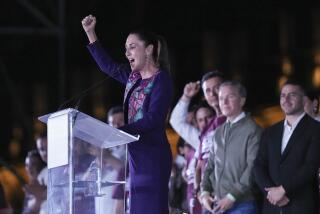Ouster of Finance Chief Viewed as Opening Shot in Battle for Mexican Presidency
- Share via
MEXICO CITY — Beyond possible repercussions for Mexico’s economic policy, the surprise ouster of Finance Minister Jesus Silva Herzog marks the opening shots in the battle for the Mexican presidency, political observers here said Wednesday.
Although elections to choose a successor to President Miguel de la Madrid are still two years away, the jockeying among political aspirants has already begun. In Mexico’s political system, the outgoing president selects his successor, who, as candidate for the ruling Institutional Revolutionary Party, invariably triumphs at the polls.
Silva Herzog was one of three or four candidates frequently mentioned as a potential successor to De la Madrid. He will not be mentioned any more.
One More ‘Shot Down’
“This is a typical thing that happens around this time,” said economist Jorge Castaneda. “Candidates are set up and shot down.”
Reasons given so far for the dismissal of Silva Herzog are contradictory. Sources in the president’s office said that he favored the international banks in Mexico’s negotiations with them over payment of the country’s foreign debt, which has risen to nearly $100 billion.
This, they contended, put him at loggerheads with De la Madrid, who was pressing for easier terms from the banks. Heavy payments on the debt’s interest are considered a drag on Mexico’s economy.
However, in recent weeks, Silva Herzog publicly raised the possibility that Mexico might stop paying off its debt. That stand is tougher than De la Madrid’s public position. De la Madrid has said only that Mexico should pay less to the banks.
Further, sources close to the president have emphasized that a debt moratorium is not in the offing, regardless of Silva Herzog’s dismissal.
In Washington, two international debt experts disagreed Wednesday about the effect that the finance minister’s ouster would have on Mexico’s negotiating stance.
The chairman of the U.S. Federal Reserve Board, Paul A. Volcker, said he doubts that Mexico would now default on interest payments because to do so could undermine efforts to resolve the debt crisis throughout all of Latin America.
Volcker told the House Foreign Affairs Committee that Silva Herzog was “caught in the middle” of internal Mexican politics.
He said of Gustavo Petricioli, who was named to replace Silva Herzog, “Nothing I know about the background of his successor would indicate a change of position.”
However, Robert S. McNamara, former president of the World Bank, said Herzog’s departure could spell problems for resolving Mexico’s debt crisis.
“Herzog was a bright, strong finance minister. And if he’s been moved out, it’s a good indication that his policy will be changed,” McNamara told reporters.
No matter how the debt question is finally resolved, Silva Herzog provides a convenient scapegoat. Should Mexico keep making payments and the Mexican economy continue to stagnate, it all can be blamed on policies designed by Silva Herzog over the last four years. Should Mexico declare a moratorium, it can be characterized as a reluctant response to the failure of Silva Herzog to stand up to the bankers earlier.
“Sacrificial lambs are hardly unusual in this country,” a political scientist said. “Now, with the presidential race on the horizon, Silva Herzog’s enemies were probably out to get him anyway.”
A Western diplomat added, “Efforts to paint Silva Herzog as a stooge of the bankers are undoubtedly promoted by his political rivals.”
Silva Herzog’s exit both clarifies the presidential race and opens possibilities for new candidates to enter the field.
Within De la Madrid’s Cabinet, two other names have been prominently mentioned as potential successors: Interior Minister Manuel Bartlett Diaz and Mining Minister Alfredo del Mazo. Adolfo Lugo Verduzco, the head of the Institutional Revolutionary Party, is also said to be in the running.
Silva Herzog was the leading presidential candidate among the so-called technocrats in government--politicians who have spent their careers in administration rather than in elected posts. Now, the technocrats’ presidential mantle will probably will fall to Carlos Salinas de Gotari, the minister of planning.
More to Read
Sign up for Essential California
The most important California stories and recommendations in your inbox every morning.
You may occasionally receive promotional content from the Los Angeles Times.













